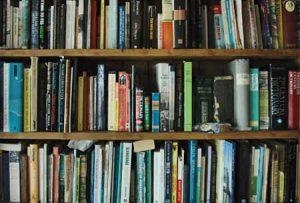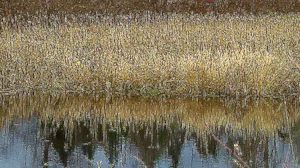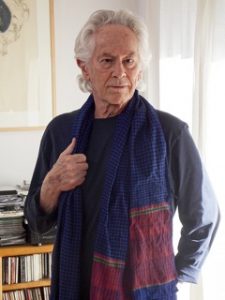
Juan Arabia (b.1983 in Buenos Aires, Argentina) is a poet, translator and literary critic. He studied Social Sciences at the University of Buenos Aires and is now the director and publisher of the website, Buenos Aires Poetry. In the course of his work he has interviewed many poets including John Ashbery, Dan Fante and Robert Darnton; translated several works into Spanish and collaborated on the production of several publications in conjunction with the Department of Modern Languages at the University of La Rioja (Spain) and other academic institutions.
NL: When did you first begin to write and what inspired you initially to become a writer?
JA: I started to write poems (and jot down ideas and thoughts) during my last years in high school. However, when I went to university, my main influences were philosophers and musicians rather than writers per se. It was largely due to the singer / songwriter, actor and poet, Marilyn Manson, for example, that I started to read the poems of Lautréamont… but when I started to write literary criticism, I began to pay more attention to the work of academics in the field. Maybe Raymond Williams was my first serious influence, especially when I wrote my first book of criticism about the Italian novelist, short story writer and screenwriter, John Fante.
NL: What does being a writer mean to you?
JA: I think it means to live a fuller life, in a real and radical way and to have a real commitment to people and society.
NL: When you write your poems, where do your ideas come from?
JA: For me, poetry always comes out of personal experience itself. Criticism, on the other hand, develops out of my formative reading.
NL: What are the main influences on your poetry and how do they manifest themselves in your work?
JA: I am always receptive to new influences, with the result that my style changes, albeit in a subtle way, most of the time. However, there are some influences that are more lasting than others, for example, the poetry of Arthur Rimbaud. I think part of my hermetic work is influenced by him. There are others, of course, whose writings will always remain of importance to me: Dylan Thomas, Hart Crane, Walt Whitman, William Blake, Paul Verlaine, Federico García Lorca and César Vallejo. I have also been influenced by writers whose work is less well represented in the literary corpus, such as Stefan George or Luis Omar Cáceres.
NL: What have you published to date and what projects are you working on at present?
JA: A few years ago I published a collection of poems, and then two books of literary criticism: my first one, as I mentioned earlier, was about John Fante. In another book, Postscript to the Beat Generation. I wrote about the work of several authors (Salinger, Coleridge, Kerouac, etc.). I am currently working on a book of poems. This is the most important project to date.. As a translator, I am now finishing a collection of poems by Dan Fante called A Gin-Pissing-Raw-Meat-Dual-Carburetor-V8-Son-Of-A-Bitch from Los Angeles, and at the beginning of this year, my translation of the New Verses and Songs by Arthur Rimbaud, was published.
NL: You are also an editor and a publisher. What were your objectives when you set up Buenos Aires Poetry and, later, Pippa Passes?
JA: The main objective was to have a secure, stable place in which to publish poetry and criticism. To avoid having to deal with market interests and cultural structures which I view as the main enemies of true criticism, of true poetry.
NL: Do you feel positive about the future of poetry in Argentina?
JA: It all depends on the prevailing climate, by which I mean the interplay of cultural and political ideologies. These forces can be very powerful in my country. We´ll have to wait and see what happens.
Three Poems by Juan Arabia
The Man With The Wind In His Heels
“If we are absolutely modern—and we are—t’s because Rimbaud
commanded us to be”.
—No, that’s a lie.
Rimbe* never said you could talk on his behalf
From your 5-star Hotel Lautréamont,
From the self-complacency of university
And Utah hamburgers.
—No, No…Gentlemen!
First thing first:
I’ll dream tonight
That your eyes are Rimbe’s eyes
Like the goodness of a woman who lies
And of whom only I request a lie.
I:
Well, we unloaded the cart:
Just a few bottles of wine and Rimbaud’s poppies.
We grew up without realizing it, and now we wait on the road.
At least we were close to the people and their land,
Even though our habits were corrupted.
In the beginning, the town was light-blue,
The sun woke us up and left us giddy after noon.
We were the shiny grapes of summer,
We stripped the wind bare.
II:
It’s not hard to understand
Why the eternal needs to spill blood.
They are only surprised at what they daren’t do:
And I find the sea, I see my face
In the lizard mirror…
And though the night is cold
I won’t die for being here.
Although they postpone the communion,
I can kill God, writing “He’s dead”
On a chair.
*[“Rimbe” is an abbreviation for Rimbaud].
Charleville Days
At dusk the birds form
a castle made of songs
inside the trees.
Together they hide in the branches
and with their voices imitate
the red, green and yellow tone
of the leaves
which fall in autumn
and protect us
from the summer sun.
Charleville-Mézieres, 2014
Abracadabra
I’ll take my heart to a pawn shop
until it becomes a bird
and from it new stars
will fall for the world.
Because I still travel
—I’m a stranger—
bridges in cities
fall silent and shun me.
I’ll hide from atrocities
and injustices
until the dawn turns rosy
and heals itself.




Leave a Reply